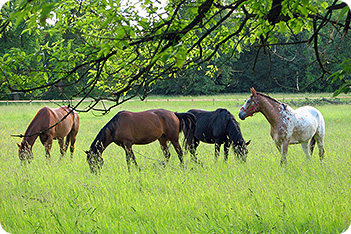
Horse Worming
Equine Worming
From: Horse Care
See also: Horse Worms | Horse Wormers (Manufacturers) | Horse Wormer (Chemicals) | Horse Worming Schedule

Horse Worming
Horse worms (as internal parasites) range in significance in relation to their affect on a horses health, from a minor loss in weight or loss of blood or irriatation and growths, to possible death.
It is essential therefore for the horse carer to understand worms and deal with them properly themselves with product advice from manufacturers guidelines, or to take expert advice from a veterinary surgeon or very knowledgeable supplier.
All horses will have some internal parasites at all stages in their life, and it often requires laboratory tests to discover these in the early stages. However, since prevention is better than cure, worming is usually carried out as a regular preventative measure.
How Horses Get Worms
Horses get worms, as worms can live as eggs or larvae in the grazing pasture, in feed, in a mares milk and on their coats, via flying insects, and in their living environment generally.
Worms therefore spread amongst horses by contamination via faeces, feeding, flying insect bites and egg laying, and direct contact. For example some are intestinal parasites and their method of breeding and spreading is via the horse host, and the contaminate product of the host system ie faeces.
It should be clear therefore that where several horses live in the same locations, it is not difficult to end up in a multi-contaminated situation. Shared pastures, stable blocks and yards, feed buckets, and horses coming into contact with each other are all potential risks for spreadng worm infestation. Hygiene is as prerequisite to horse health as to human health. In addition other measures are needed for the control of worms.
Horse Wormers
Horse wormers are sold as specialized drenches, as bot drenches (bots are in fact flies) or broad spectrum drenches. These usually provide in a single application the necessary chemicals to deal with a significant portion of the infestation. To deal most effectively with all worm types, therefore, a horse worming programme should be developed.
Horse Wormers (Brands Available)
There are a variety of brands of horse wormer available such as:
- Noromectin
- Equest
- Equest Pramox
- Equitape
- Vectin
- Panacur
- Panacure Equine Guard
- Eqvalan
- Equimax
- Eraquell
- Telmin
- Strongid P
- Pyratape P
The companies who manufacture these products are obviously experts on the treament of worm infestation in animals and you should stick to their guidelines for use or let a veterinary surgeon advice you or treat the horse/s.
Be aware also that such treatments (like all medicines) may have side effects which you should be aware of, and expert practioners may know of products which are problematic even though manufacturers will stand by such products for commercial reasons.
More information on Horse Wormers (Brands)
Horse Worming Schedule
There are many different opinions on worming programmes, the three most popular are strategic worming, tactical worming and targeted worming. The use of the most appropriate wormer at the correct time and dose needs to carfully looked into and your veterinary surgeon is the best person to advise you on a suitable programme based on your horses own individual needs such as the age of your horse, if your mare is in foal when they were last wormed and so on.
More About Worming Schedules
Horse Worms
There are many types of worm that can affect horses including:
- Large Redworms Or Large Strongyles (Strongylus Vulgaris, Strongulus Edentatus and Strongylus equinus)
- Ascarids or Large Roundworms (Parascaris Equorum)
- Small Redworms or Small Strongyles (Cyathostomes)
- Pinworms (Oxyuris Equi)
- Lungworms (Dictyocaulus Arnfieldi)
- Hair Worms (Trichostrongylus Axei)
- Stomach Hair Worms (Habronema Muscae)
- Large Mouthed Stomach Worms (Draschia Megastoma)
- Neck Threadworms (Onchocerca Cervicalis)
- Instestinal Threadworms (Strongyloides Westeri)
- Tapeworms (Anoplocephala Perfoliata, Anoplocephala Magna, Anoplocephaloides Mamillana)
- Bots* (Gasterophilus)
*Bots are actually flies.
More informaton on Horse Worms
Horse Wormers (Chemicals Used)
Several families of chemicals are used for horse worming, and understanding these will more effectively help you understand manufacturers products.
However if in any doubt, follow manufacturers guidelines for your choice of product, and if you still have problems consult a qualified veterinary surgeon.
This information is provided for your laypersons understanding, not to make you an expert on their administration in equine or any other circumstances!
- Albendazole, Ricobendazole, Oxfendazole
- Bayverm
- Benzimidazoles (Fenbendazole, Membendazole, Oxibendazole)
- Diphenylsulfides (Febantel)
- Hexahydropyrazines (Praziquantel)
- Macrocyclic Lactones (Ivermectin, Moxidectin)
- Tetrahydropirimidines (Pyrantel)
More information on Horse Wormers (Chemicals Used)